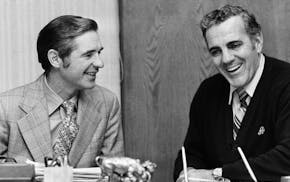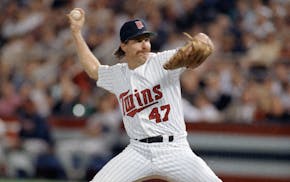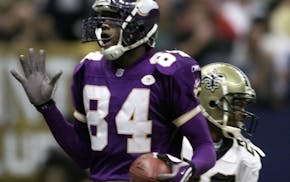This will be the 19th modern Ryder Cup between the United States and Europe and the 41st in the long history of the event, and it will be a true showcase for what can easily be considered the most important golf course in Minnesota, Hazeltine National Golf Club.
There is perhaps no one more well-versed in the history of that course than Reed Mackenzie, who has been a member of the club since 1966, helped bring the U.S. Open there in 1991 and was named the president of the United States Golf Association in 2002.
Mackenzie recalled the issues surrounding the Minikahda Club in Minneapolis that led to the creation of Hazeltine in 1962.
"I was not around, but I'm very familiar with that history because it's a part of the lore of Hazeltine," Mackenzie said. "Minikahda at that time, which was in the 1950s, had Excelsior Boulevard running through the middle of the golf course, and there were fears that Excelsior Boulevard on one side and France Avenue on the other side would both expand and take up the land used for Minikahda.
"It was thought that they would build a country course, and then if the worst happened and civilization made an in-town course impossible, they would have an alternative. At a very stormy membership meeting at Minikahda, the membership said that no, they were not interested in doing that. They had already picked the land and had brochures distributed to the membership to come out and look at this beautiful property overlooking Lake Hazeltine."
Mackenzie said members were not interested in that deal, and that led to conversations between Hazeltine founder Totton P. Heffelfinger and Bob Fischer, a Minneapolis banker who was helping to finance the course.
"Fischer said that if you're going to go ahead and want to have a site for major championships, you need to have the best architect available, and that led to the relationship between Heffelfinger and Robert Trent Jones and Bob Fischer and several others that resulted in Hazeltine National Golf Course being built," Mackenzie said. "It was at that time to be called the Executive Golf Club but later that was changed to Hazeltine."
Ultimately the worries about the Minikahda Club did not come to pass, and that course still stands, but it did lead to Hazeltine.
Still, Mackenzie said even though Hazeltine had such a great pedigree, it took years for the course to built its membership, because of how seemingly far west Chaska was at the time.
"It took a long time for the membership to develop," he said. "It did go through some difficult financial times. I don't think there was ever a threat that it was going to go away, but certainly there were several times where the membership was assessed and there were concerns about how it was going to keep going."
Fielding majors
The big thing that turned Hazeltine around was two major championships being held there, the first being the 1970 U.S. Open.
Still, Mackenzie recalled that that event was criticized so badly, the course didn't play host to another men's major until the 1991 U.S. Open.
"There were critical points in the history of the club where the mission to have major championships was jeopardized," Mackenzie said. "It was jeopardized because the people who run the championships, the United States Golf [Association] and the PGA, thought the course needed some modifications or changes."
When it came to the key members in getting majors there, Mackenzie listed a lot of names. "Initially it was Totton Heffelfinger, he was a former president of the United States Golf Association and he persuaded the USGA to come here in 1966, when the course was only in its fourth year, with the Women's Open won by Sandra Spuzich, and about the same time he persuaded the USGA to bring the 1970 U.S. Open here, and that was won by Tony Jacklin, and the course at that time, as you may recall, got quite a bit of criticism."
Golfer Dave Hill, notably, said at the time, "They ruined a good farm when they built this course."
"There was a question of whether we would get another major back, and some of us worked very hard to not only produce the necessary changes in the club but keep in touch with the USGA but persuade them that they should award the 1991 U.S. Open to Hazeltine," Mackenzie said. "Once the 1991 Open was carried out and the world saw what a wonderful golf market this was, the rest was easy."
Now Hazeltine will play host to what is easily known as the largest golf tournament in the world, and just like a lot of people before him, Mackenzie can surely take some of the credit.
Can play with Penn St.
The Gophers will face Penn State on Saturday for the first time in three years.
Somewhat surprisingly, the Gophers are 5-8 in 13 games against the Nittany Lions in their history.
The Gophers won the most recent contest under coach Jerry Kill in 2013. Before that, Penn State had won four in a row in the series. But the Gophers had won four in a row under Glen Mason from 1999 to 2004. Penn State won the first four meetings between 1993 and '98 after joining the Big Ten.
And there's a good reason Penn State is only favored by 2½ at home to a Gophers team that hasn't dominated yet. The Nittany Lions gave up 515 yards, seven touchdowns, 11 third-down conversions and six sacks in a 49-10 blowout loss at Michigan last week.
Jottings
• Eli Manning has had seven starts vs. the Vikings over his Hall of Fame career, and only once, in 2013, has he thrown more touchdowns than interceptions in those games. Five of his 14 interceptions in those seven games have been returned for touchdowns. The Giants are 2-5 against the Vikings in Manning's career.
• If you believe the statistics through three games, the Vikings are going to have a hard time running the ball vs. the Giants on Monday. The Vikings are last in the NFL, averaging only 51.0 yards per game on the ground, while the Giants have the fifth-best run defense in the NFL, giving up only 77.3 yards per game.
• The Giants have the NFL's sixth-rated offense at 297.7 yards per game. Last week vs. Washington they totaled 457 yards in a 29-27 loss.
• The Gophers baseball team made it official on Thursday by announcing that Patrick Casey has been made a full-time assistant coach. Ty McDevitt will be an assistant pitching coach.
Sid Hartman can be heard weekdays on 830-AM at 6:40, 7:40 and 8:40 a.m. and on Sundays at 9:30 a.m. shartman@startribune.com

Sid Instant Replay from 1977: Vikings' Super Bowl loss to Raiders hurt the most

Read Sid's column from 1974, when Ara Parseghian left Notre Dame

Sid instant replay: No greater hero than Twins' Morris in World Series


